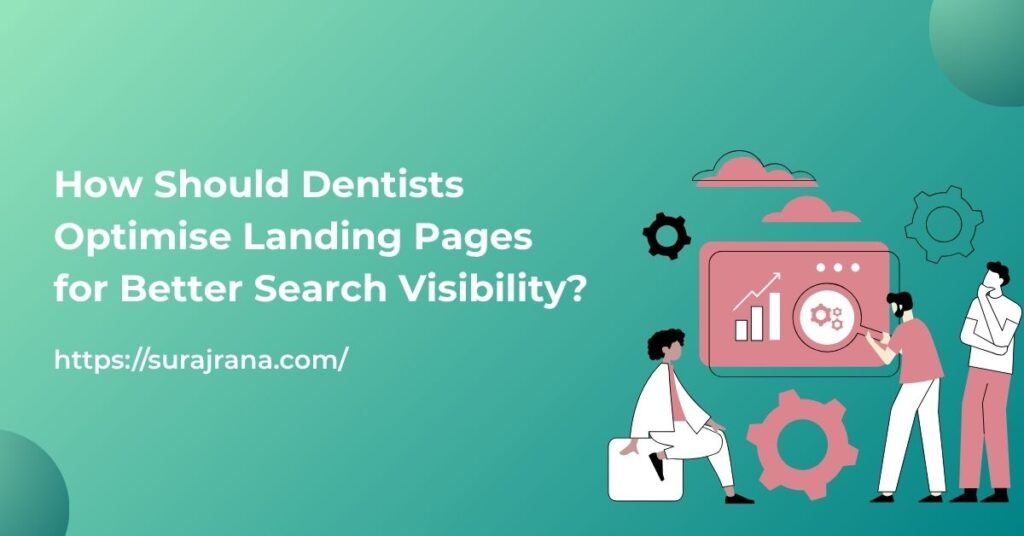When people search online for a dental clinic, they’re not just looking for information—they’re ready to make a decision.
And in many cases, the first page they land on will decide whether they call your practice or move on to another. That’s why a strong landing page is so important.
For dentists, a well-designed landing page is more than just a digital business card. It connects your services with people in your area who are searching for what you offer. If your landing page is built with search visibility in mind, it becomes a powerful tool to attract new patients and grow your clinic.
What Is a Landing Page and Why Does It Matter?
A Simple Explanation of Landing Pages
A landing page is a web page focused on one specific topic or service. It’s not your home page or an “about us” section. Instead, it’s where people “land” after clicking on a search result, an ad, or a link from social media.
Let’s say your clinic offers teeth whitening. You could have a landing page that talks only about this service—what it is, how it works, and why patients choose you for it. The page should answer the visitor’s questions quickly and encourage them to contact your clinic. A well-structured landing page, especially when built with the help of a Local Dental SEO Agency, can improve your visibility in search results and bring in more local patients.
Why Google Cares About Landing Pages
Search engines like Google want to show the most useful and relevant pages to people. If your landing page clearly explains the service, includes location-based terms, and loads quickly, Google is more likely to recommend it.
A targeted landing page also helps keep people on your website longer, which tells Google that your page is helpful. This can improve your search rankings over time, helping more people find your clinic.
Key Elements of a High-Performing Dental Landing Page
Clear Headline That Matches Search Intent
The headline of your landing page should match what people are searching for. If someone looks up “Emergency Dentist in Parramatta,” and your page opens with “Need Urgent Dental Care in Parramatta?”, it reassures them they’re in the right place.
A clear and direct headline keeps visitors from clicking the back button. It helps them feel like they’ve found exactly what they need.
Simple and Focused Page Content
Too much information can overwhelm visitors. Each landing page should focus on just one service. If the page is about Invisalign, avoid adding details about fillings or cleanings. Keep your language simple and direct.
Use short paragraphs to make the page easy to scan. Break up longer sections with subheadings so people can quickly find what they’re looking for.
Local Keywords Matter
Most dental patients look for nearby clinics. That’s why your landing pages should include the name of your suburb, city, or local area throughout the content. For example, instead of saying “we offer braces,” say “we offer braces in Bankstown.”
These small changes make a big difference in how your page shows up in local searches.
Mobile-Friendliness and Fast Loading Time
More than half of all searches come from phones. If your landing page doesn’t work well on mobile, visitors might leave before reading anything. Make sure your layout adjusts to smaller screens and that all buttons are easy to tap.
Also, page speed matters. Large images and messy code can slow things down. A fast-loading page helps you rank better and keeps visitors happy.

How Dentists Can Optimise Landing Pages for SEO
Use One Focused Keyword per Page
Each landing page should be built around one main keyword. If you’re writing about dental implants, keep the focus on that and don’t mix in root canal details.
This makes your page more relevant to people searching for that specific service. It also helps search engines understand what the page is about. When done correctly, this approach improves Best Dental SEO clinics significantly.
Add Location-Based Phrases
People often search with location in mind, like “braces near me” or “tooth extraction in Sydney.” Including your suburb or city naturally in the content helps match these searches.
Mention your location in the page title, headings, and body text. But don’t overdo it—just enough to make it clear where your clinic is based.
Structure Your Content with Headings
Headings like H2s and H3s help break up the content and make it easier to read. They also guide search engines through your page. Think of them as mini titles that organise your message.
Each heading should relate to a specific topic. For example, use “What Is Invisalign?” or “Benefits of Teeth Whitening” to keep things clear.
Write Easy-to-Understand Meta Titles and Descriptions
Your meta title and description are what people see on Google before they click. Make them short, helpful, and include the service and location. A good example might be, “Gentle Tooth Extraction in Blacktown – Book Today.”
A well-written meta description gives users a reason to visit your page. It’s like your first impression in search results.
Optimise Images with Descriptive Text
Images are great for showing off your clinic or your results, but they also help with SEO when used properly. Use descriptive file names like “veneers-westmead.jpg” and write alt text that explains what the image shows.
This helps Google understand your content better, and it also makes your page more accessible.
Make It Easy for Patients to Take Action
Clear Call-to-Action Buttons
Your landing page should guide visitors toward the next step. A strong call-to-action (CTA) like “Call Now,” “Book Your Appointment,” or “Schedule a Consultation” makes it clear what to do next.
Use bold, easy-to-see buttons and repeat your CTA a few times throughout the page—at the top, middle, and bottom.
Add Contact Info Above the Fold
Place your phone number and address near the top of the page so people don’t have to scroll. This is especially helpful for visitors on mobile phones who want to contact you quickly.
You can also include a clickable phone number so they can call with one tap.
Use Online Booking Links or Forms
Some patients prefer booking online, especially outside office hours. Adding a simple form or a link to your booking system makes it easy for them to take that step.
Keep the form short—name, phone, email, and preferred time is usually enough.
Use Real Trust Signals to Build Confidence
Show Real Reviews and Testimonials
Patients trust other patients. Adding real reviews to your landing page can make new visitors feel more comfortable. Include the person’s first name and photo if they’re happy to share it.
A few well-placed quotes can go a long way toward building trust.
Add Before-and-After Photos
If your clinic provides cosmetic treatments, before-and-after images are powerful. They help people visualise what kind of results they can expect.
Make sure you have permission to use these photos, and add short captions to explain the change.
List Professional Associations and Credentials
Logos of dental associations or certifications can show that you’re qualified and up to date with professional standards. This kind of trust-building content reassures new patients that they’re in safe hands.
Measure What’s Working and What’s Not
Use Tools Like Google Analytics
Once your landing page is live, you need to track how it’s performing. Tools like Google Analytics can show you how many people visit your page, how long they stay, and whether they click or book.
This data helps you make smart updates over time.
Track Calls, Clicks, and Bookings
If you’re running ads or using call tracking, you can see which pages lead to actual appointments. That way, you can invest more in what’s working and improve what’s not.
Understanding how visitors behave on your landing pages is a key part of improving SEO for dentist practices and bringing in more patients consistently.
Conclusion
Landing pages are one of the most powerful tools a dentist can use to attract new patients online.
When they’re built with search visibility in mind—using focused content, local keywords, strong calls-to-action, and real trust signals—they don’t just get clicks. They bring in bookings.
Start with one service and make that page as helpful and clear as possible. Then move on to the next. Small improvements in your pages can lead to big results in patient growth.
If you want support building high-performing landing pages that rank well and convert visitors, experts like Suraj Rana can help you take the guesswork out of the process.

My name is Suraj Rana, and I am a seasoned Dental SEO Specialist with extensive experience in the Dental SEO industry. Leveraging my deep knowledge and expertise, I help dental practices enhance their online visibility and attract more patients.


